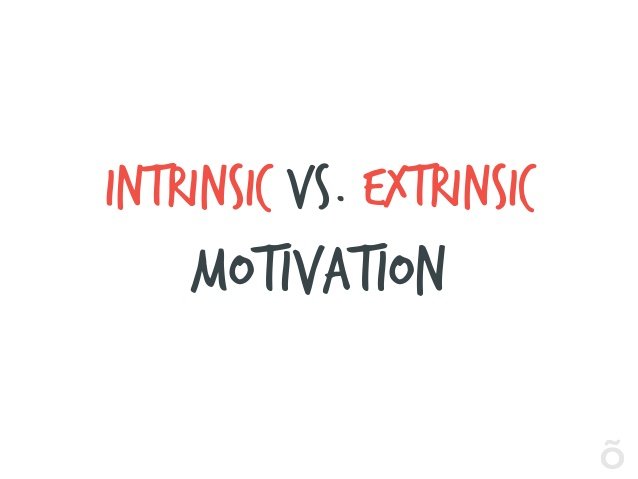Intrinsic Motivation and Extrinsic Motivation
Motivation comes from the root word 'motive', an urge which demands satisfaction. These urges, desires or needs may be general, internalized or generally inherent. Over time, this becomes a strong desire which causes individuals to take appropriate action. They achieve these motivational needs by engaging in appropriate actions that satisfy the motivational need and the circumstances or environment in which they function.

Motivational theories about motivation suggest that humans are capable of using at least four basic motivations: survival of the fittest, affiliation, power, and achievement. Motivated people are able to use these motives in various contexts to promote their own interests. They use motivation as a source of personal growth and achievement.
People who are highly motivated are able to meet their objectives. This can include meeting goals of a work-related nature, gaining personal development, making significant contributions to groups, motivating team members to work hard, setting goals and breaking important goals. The motivation to work hard can be internalized through a sense of personal worth. When a person feels worthwhile, their motivation level increases, leading to increased achievement. Other external factors such as persistence, motivation and the support network play an important role in achieving set goals. Achieving specific goals also depends on external cues such as rewards.
Motivational theories about motivation propose that there are many different motivators that drive employees to achieve their goals. Some of these motivators are: external reinforcement, recognition, a sense of power, personal growth, and financial rewards. These motivators can cause employees to work very hard. However, when employees are motivated, they produce high quality work, produce low cost and make the company profitable.
Many employees are not highly motivated at all. They give little effort and do not want to work very hard. For this reason, the manager is responsible for getting these employees motivated. If an employee gives low quality performance, it is usually not because of his own failure to motivate employees but because he is not receiving positive feedback from his boss. In order to get these low performers to improve, managers should praise employees for good work, share positive comments, give incentives and other rewards.
An employee's level of motivation can be determined by observing how motivated they are when faced with a certain challenge. An example is if a group of employees is given an incentive program and asked to complete it in a short period of time. When employees are motivated, they finish the assignment without any problems. This may sound simple but motivation is more complex than this.
To keep working properly, employees need to understand what motivates them. One of the best ways is to motivate people to work hard through praise and recognition. Employees that see their bosses complimenting them are motivated to work harder because they see themselves as a valuable member of the team. It also helps when an individual has reached some goals or gets close to achieving them to start publicly appreciating their achievements.
Learning new things or improving on your skills is another way to stay motivated. This will keep you interested in what you do and you will have something to look forward to every day. This will increase the likelihood of reaching the goals you have set and motivate you even more. The most important thing to remember is that motivation does not just come from personal experiences. Employers need to encourage employees to stay motivated and reach their goals by giving them the right kind of tools and guidance.
Motivational programs include training, advice and support, as well as the right external rewards. External rewards can be in the form of time off, cash bonuses or recognition for specific achievements. These are all tools that can help employees use extrinsic motivation to achieve their goals.
There are many different types of motivation. People respond differently to different types of incentives. One of the best ways to find out what works is to ask people you know for their opinions. They will have first hand experience and can guide you to the best source of motivation. Motivational quotes and stories are a great source of inspiration. Just keep in mind that there are different types of motivation and that some types of motivation may not be appropriate for certain people or circumstances.

Keep in mind that there is no single type of motivation that works for everyone. Each person uses extrinsic and intrinsic motivation differently to achieve their goals. You must find what works best for you. Don't give up and try different techniques. Eventually, if you succeed, you will find that you have an intrinsic motivation that moves you forward on your own.